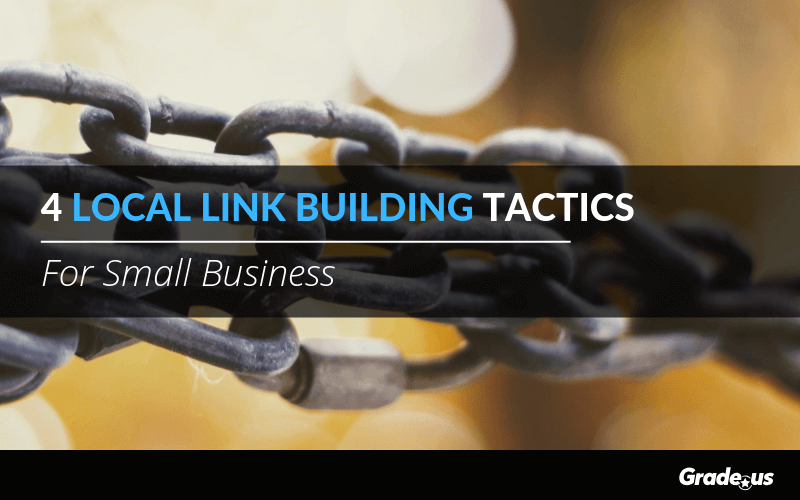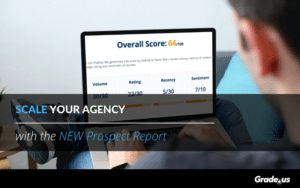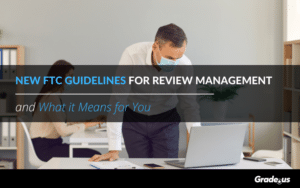Your links are like votes and the web is built on links. The more (quality) links you acquire, the easier it is to build awareness, generate traffic and win new customers. It's a simple and straightforward strategy local businesses can use to grow. That's why local link building still matters for your visibility on Google.
Here's the issue. There are more than 200 ranking factors, signals used by Google to sort, categorize, and list web pages. It's 2019, where do we stand on the value of links for a local business?
Are links as important as they used to be?
In the past, the most important factors were:
- Your URL
- Meta tags (description and keywords)
- Keyword intent
- Content structure
These details have changed a bit but many of these factors are still incredibly important. However, Google's approach has gone through a natural evolution. In a recent Moz post, Eric Enge shared his study showing there's still a very strong correlation between links and rankings.
If you're a search marketer this is obvious.
Why bother stating the obvious? Because several pundits continue to state that Link. Building. Is. Dead. When you think about it, this is a bit strange. Enge raises an important point.
"Google's public statements and its actions (in implementing penalties) also tell the same story. In short, links still matter. But we also see a clear indication that the nature and the quality of those links matter too!"
What does this quote mean?
The implications aren't as obvious. Google understands the context and value of each link. They're aware of several secondary and tertiary factors that relate to links. These issues impact how they decide to rank web pages.
Details like:
The authority of the linking site
Technical data e.g. https, page speed, and responsive design, which all impact rankings
The user experience
Here's the thing about the links in these bullet points. They come from Google directly. Google has gotten much better at identifying and categorizing quality content, pages and sites. Long story short. Higher quality links = better rankings. Better rankings = more traffic to your website.
Which again, is obvious.
Link building is fantastic if you're managing a regional or national brand. What if you're running a local (or hyperlocal) small business? Is there a way to maximize the link building benefits (rankings, traffic, conversions) you receive?
Absolutely.
Here are four local link building tactics you can use for your local or hyperlocal small business.
Local Link Building Tactic #1: Build Internal Links
Steve Morgan asked an interesting question in his link building post.
"What site has some of the strongest organic rankings ever and has a LOT of links, but has probably never spent a penny on link building activities? Wikipedia."
A study from Pi Datametrics made some startling observations about Wikipedia's internal linking practices. Keep in mind that Wikipedia's primary focus is providing users with informative/educational content - not marketing.
- Wikipedia is ranked on page one of Google search results for 99 percent of searches (of nouns)
- Wikipedia is ranked in position one of Google for 56 percent of searches
- 96 percent of searches had Wikipedia in positions 1-5 in Google search results
This isn't new, but it is a tactic that's frequently ignored. It's particularly a problem for dentists, lawyers and brands in the service industry. How do you improve your visitor time on site naturally? Here's how you use internal links to boost rankings, traffic and conversions.
1. Produce lots of informative and educational content. Wikipedia is on top because its content is informative and educational. They follow strict editorial content standards and guidelines. Use tools like Answer the Public to create content that's outstanding, precise, free from agenda, focused on serving visitor intent and true to ethical standards. Example content includes FAQs, Q&As, Glossaries, blog posts, infographics, educational content pieces, research reports, and ebooks.
2. Make sure your web pages are reachable. Many sites produce exceptional content that's inaccessible to search engines. If Google can't get to your content they can't rank your content. Avoid links that are hidden in a drop-down menu or placed behind forms. Avoid links that are only accessible via internal or on-site search boxes. Avoid placing content links in un-parseable Javascript, Flash, Java or other plugins. Avoid linking to pages that are blocked by the meta robots tag or robots.txt.
3. Keep your internal link structure clean. Create hub and spokes content. Link to your other blog posts or content. Use a tool like NPM's Broken Link Checker to reduce/eliminate 404 errors on your site. Consolidate your links. Don't link to the same items multiple times on a single page. Don't link twice when one link is sufficient.
This strategy is perfect for service businesses (e.g. lawyers, accountants, dentists, consultants, creatives) because it enables you to establish deep expertise and trust with prospective clients and Google. Here are a few examples outlining how you can use internal linking for your local service business.
- Use question and answer sites like Avvo, Quora, Yahoo Answers and Answer the Public to identify questions (problems) clients want you to solve
- Share your answer on this site, then share a more in-depth answer on your site. Use local keywords (e.g. county, state, region or zip code) as modifiers to improve content performance at a local level
- Create a contextually relevant offer (e.g. more information/education) on a topic prospects find interesting. Include an introductory incentive (e.g. discount, trial, bonus, etc.) in your offer
This sounds like you have to create a significant amount of content, doesn't it?
In a way, it's true. If you're creating zero content, this will be a significant change. If you're creating 2 to 8 pieces of long-form content per month, you can use the GaryVee content model to turn that into 4 to 32 pieces of content per month with minimal effort.
Take a look.
It's an easy way to increase your content production efforts without a significant increase in money, manpower, or maintenance.
Local Link Building Tactic #2: Outbound links + Outreach
This strategy uses the power of outbound links, social proof and authority sculpting to produce exceptional results for local businesses. The strategy is simple.
1. Create exceptional content. This isn't simply a buzz word. When I use the term "exceptional content" I'm referring to content that's superior due to: drama (a compelling story), design (beautifully designed), depth (a deeper dive into the topic), data (original or third-party research), or degree (10x content churned out at a pace that's difficult to match).
2. Include quotes/content from local experts, thought leaders, and influencers. When relevant, add quotes or content from expert sources. Create outbound links pointing to these experts. You're looking for insightful thought leadership or outstanding content from top notch thinkers and content producers. Do your best to avoid content that can be categorized as "noise."
3. Outreach to those mentioned in your content. There are two ways you can go about this. (a.) You reach out to a list of these experts and ask them for their feedback and advice on a specific topic. You accept the feedback from those who shared and send everyone an email of the final result once your content is live. (b.) You share an existing quote from these subject matter experts, then send them an email letting them know that you've published their content and that you'd be grateful for any shares/links they can contribute. Finally, you'll want to send the completed product out to everyone, including those who ignored your initial pitch. They may be more receptive to future requests.
This method requires a lot of hustle but it's a fantastic way to build links. If you've created exceptional content (see step 1), you'll find it's easier to attract attention from exceptional content creators.
Here's an email template you can use/customize.
Hi [Name],
I'm creating a blog post for [site] on [topic]. The title is [headline]. I'm reaching out to exceptional thought leaders and experts and I'm interested in getting your take on this.
Would you be willing to share a quote on the following question?
[question]I appreciate any advice you're willing/able to share.
Thanks again,
[Signature]Local Link Building Tactic #3: Me Too / Upgrade Inbound Links
Here's a classic strategy with a twist.
First, make a list of well-ranked competitors. Your focus isn't set exclusively on official competitors. When I use the word competitors, I'm focused primarily on competing content. Your list should include general, specific, niche and specialty competitors. Next, you'll want to create a list identifying the people who link to these pieces. You can use well known tools like Moz Link Explorer, Ahrefs, Majestic SEO, or SEMRush to answer two important questions.
1. Who links to your competitors? This is a list of the possible sources you can approach with exceptional content (e.g. drama, design, depth, data, degree). You're looking for what Rand Fishkin calls the Linkerati - bloggers, Reddit/forum posters, news writers/publishers, content creators, resource editors, social taggers, viral connectors and journalists.
2. What kind of content do they link to? This could be original data or research, beautiful infographics, a compelling story about you, your customers or your business, etc. Whatever it is, it's a topic that's interesting to both of you. This assessment gives you a clear understanding of the type of content that attracts attention from those who would link to your business.
Next, look at your content inventory. Do you have exceptional content that fits with the content Linkerati are already linking to? If not, it's time to create some. Create content that blows anything they've linked to out of the water.
Linking to you should be obvious. This is an eye-opening experience. This research will expose specific trends like:
- Content preference: Conversational, academic, data-driven, op-ed, combination (e.g. story + data driven)
- Visuals: charts, memes, infographics, etc.
- Length: Long form, short form or variable
- Depth: In-depth vs. shallow content. Surface level vs. thorough and possibly unpleasant
- Risk tolerance: Controversial (more links, more polarization, possible infamy), Prudence (safe but requires more time, effort and resources) Value driven (requires fresh data or insights others don’t have)
Take the time to learn these lessons as it will make future link building efforts easier.
At this point, you're ready for outreach.
Reach out to each of the sources in your list who have linked to similar competing content in the past. Use tools like Clearbit Connect to find unlisted email addresses for Linkerati. Next, craft your outreach email. Here's a template you can use/customize.
Hi [Name],
I'm the [title] of [business]. I noticed that you linked to [this post]. We've created an updated post that offers [benefit]. It's an in-depth piece and it's gaining traction online ([#] links so far).
If it meets your standards and you feel it adds value to your audience, would you be willing to add this [post] to your list?
Thanks either way.
[Signature]Here's why this works.
This post gets right to the point. It's free from superficial flattery. It's clear, concise, and actionable. It tells recipients who you are. There's social proof. It provides them with a contextually relevant link they can use to check you out. Most importantly, it highlights the amazing post you've created and the results it's currently achieving.
Local Link Building Tactic #4: Features and Interviews + Request
Wouldn't it be great if you could get others to link to you on a routine basis? Well, with features and interviews you can achieve just that.
Here's how it works.
You feature or interview Linkerati, local experts, thought leaders or influencers. This tactic is a great way to achieve significant traction, lots of inbound links, and social shares. You can use this with guest posts or blog posts on your own domains.
Here are a few examples:
If you're a real estate attorney, you can interview judges, attorneys, publishers, pundits, investors, and legal professionals. You ask them about a particular piece of legislation that has a major financial impact on real estate investors. You break the interview into three parts and transcribe the interview. You can share part one as a guest post and parts two and three as a blog post on your site.
You send a request email to journalists, judges, and Linkerati (e.g. people you've interviewed and similar professionals) asking them to link to your thoughtful interview.
You raise everyone's profile, including your own.
All it takes is a free recorded phone call with a simple tool like UberConference.
If you're a dentist, you can share controversial details other professionals do their best to ignore. You can discuss the dental amalgam controversy. You can discuss the orthodontics vs. orthotropics controversy weighing in on a side with evidence.
You can teach clients about the sobering realities they're completely in the dark about (e.g. plaque on your teeth = plaque in your arteries).
You can interview/feature nutritionists, oral healthcare professionals, researchers and scientists, outlining the impact their oral health has on their health overall. Then, once you've completed your feature/interview, you send out your request emails.
You ask for the links you want.
In fact, you can use this strategy for any local business.
If you're a farm to table restaurant that offers fresh, organic ingredients, you can do the same thing. Interview the farmers, producers, suppliers and vendors - anyone that makes that possible.
If you're running a hotel, you can promote your vendors and suppliers. You can feature/interview amazing, under the radar companies like Standard Textiles. The vendors and suppliers who provide your guests with the beautiful, durable high-quality products they use during their stay.
See what I mean?
Why are these local link building tactics so important for local businesses?
You see the value, but why are these tactics necessary?
As I mentioned in the beginning, your links are like votes. A link from an authoritative or high traffic source is worth more than a smaller, unknown, or upcoming source.
Your link profile boosts awareness.
A strong link profile, especially when combined with a powerful review profile, improves rankings, boosting traffic and conversion rates in the process. Here are some additional benefits.
- These tactics build relationships at the local, regional and national level
- These tactics increase local, general and niche keyword rankings across the board. They’re fantastic ways to win both head and long tail keyword rankings. But it requires a long term approach
- They’re win/win for you and the people who choose to promote your business
- The benefits are layered. These tactics boost search rankings, which produces traffic, which leads to a lift in conversions and revenue
- They’re repeatable. If you’ve established trust and a strong reputation with your Linkerati, you’ll find it’s easy to ask for (and receive) links from the same sources, again and again
- These tactics lead to partnerships. Consistent communication with the groups mentioned in this post opens doors. It’s a phenomenal way to increase your return on ad spend (ROAS) and decrease your ad costs
This is why these link building tactics matter.
These local link building tactics earn more votes
As Eric Enge showed, the quantity and quality of your links matter.
Google has validated this directly. Their platform has matured. They've developed a sophisticated approach to link assessment which means link building is alive and well. It has the potential to produce a significant amount of rankings, traffic and revenue for local businesses.
Link building is harder and more important than it used to be.
The more (quality) links you acquire, the more comprehensive your strategy and tactics, the easier it is to build awareness, generate traffic and win new customers. It's a simple and practical strategy local businesses can use to grow their business.
Higher quality links = better rankings. Better rankings = more traffic and conversions for your business.
About the Author
Andrew McDermott
Andrew McDermott is the co-founder of HooktoWin. He shows entrepreneurs how to attract and win new customers.









